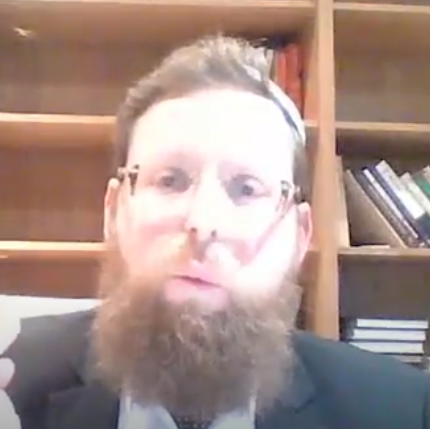
Featured Item

Beth Din puts decision to donate organs in our hands
JORDAN MOSHE
Until now, the Beth Din forbade Jewish people from donating organs, but it has spent almost a year deliberating and consulting with doctors across the community to change its policy.
The Beth Din will neither support nor oppose live organ transplants, but it will from now on assist those wanting to donate organs halachically.
“The Beth Din has taken a historical decision to allow the community to make the choice,” said Dayan Rabbi Shlomo Glicksberg on Wednesday evening last week. “Our role is to supervise the system, and help people when they make the decision for themselves.”
Glicksberg joined surgical gastroenterologist Dr Dean Lutrin in an online presentation about carrying out organ donations in South Africa within the framework of halacha. The session was facilitated by the Academy of Jewish Thought & Learning.
It marks a significant shift from the Beth Din’s previous approach, said Glicksberg.
“The fact that we did something for the past 50 years doesn’t mean we need to do it for the next 50 years,” he said. “Rabbi Kurstag and our other dayanim made the decision to give people a choice.
“We consulted leading rabbis in Israel, and reached a decision based on the needs of our community within the South African context.”
Because life is considered sacred in Judaism, organ transplantation has frequently inspired controversy where live transplants of an organ like the heart is concerned. Determining when a person is actually dead forms a central part of the discussion.
“There’s a spectrum of what it means to be dead,” said Lutrin.
He said that the 19th century innovation of artificially keeping a heart beating demanded that medical science devise a way to determine the point at which a person is deemed dead. This led to the development of the concept of brain death.
“The development of this concept happened in parallel to development of organ transplantation,” said Lutrin. “The first kidney was successfully transplanted in 1954, and a heart in 1967.”
“When Chris Barnard removed that heart, he waited for it to stop beating before he touched it. This led to a lot of debate about what dead actually meant. Is one with a beating heart considered dead? Asked differently: is one who is decapitated with a beating heart considered dead?”
Lutrin said severe head injury which causes brain death created a discussion which established death according to neurological criteria and tests. These include a neurological function test using electrodes to detect brain activity, as well as an angiogram to determine whether blood is flowing to the brain. If neither of these show activity, a person is medically considered dead.
“Brain death means brain-stem death,” said Lutrin. “The stem is the most basic part of the brain which controls breathing, reflexes, and heart rate. We want to establish that the stem is dead, that a person isn’t breathing or reacting to stimuli.”
Because certain organs require a live donor in order to remain viable for transplantation, determining whether a person is dead is a concern.
“Certain organs can be taken even after the heart stops beating, including skin and even corneas,” said Lutrin. “However, the most lifesaving organs need to be taken from one whose heart is still beating.”
For this reason, it has previously proven challenging to reconcile the procedure with Jewish law.
“Whether the donation of organs after death is allowed is a controversial halachic argument”, said Glicksberg. “It’s prohibited to benefit from the deceased, and to disgrace a body after death.”
However, not even these prohibitions stand against the precious mitzvah of saving a person’s life, he said. This makes determining the moment of death a crucial point from a halachic perspective.
“Authorities have discussed the question for decades,” Glicksberg said. “Does the heart or brain determine the moment of death?
“If it’s the heart, then that’s the end of the conversation, and it can’t be used once it’s stopped. But if it’s the brain, once the brain stem has collapsed and we can confirm that, then you can still use the beating heart for transplant in an acceptable way.”
Glicksberg said that when heart transplants were first developed, rabbinic leaders Rabbi Moshe Feinstein and former Israeli Chief Rabbi Isser Yehuda Unterman forbade the procedure, arguing that it was a double murder of donor and recipient.
The position has changed considerably since then, with the halachic argument stating that death is determined when a person stops breathing. This, said Glicksberg, can be determined by proof of total brain death, including the brain stem, which controls independent breathing.
Subsequently, a council of Israeli rabbis and doctors took a decision in 1987 that what determines the death is the brain, not the heart. Still, little changed in practice.
“It was a historical decision in 1987, but nothing really changed,” said Glicksberg. “Israeli hospitals were instructed to conduct certain tests to ensure that someone is truly dead. The council also said that they needed to ensure that a rabbi was involved in the decision, but the hospitals refused, and everything collapsed.”
In 2008, the law was amended, forcing hospitals to accept the involvement of three rabbis (one of them a licenced doctor) to decide whether a person was dead before proceeding with a transplant.
Glicksberg visited Israel to consult numerous authorities, among them Rabbi Zalman Nechemia Goldberg (a member of the 1987 council) to ask for guidance on the subject within the South African context.
“Many religious figures continue to oppose the ruling of 1987, holding that the use of organs from a person whose heart is still beating is forbidden,” said Glicksberg. “This means that there are two approaches that the diaspora can adopt.”
Consequently, the Beth Din took the decision not to rule in favour of either side of the argument, and instead opted to allow South African Jewry to make the decision on an individual basis.




